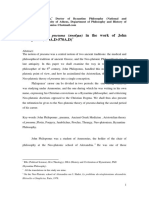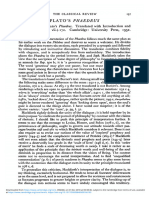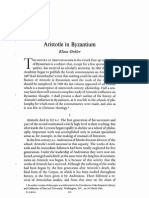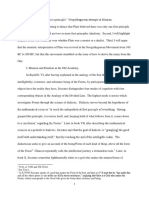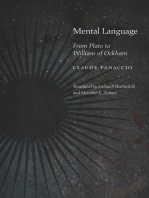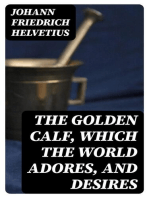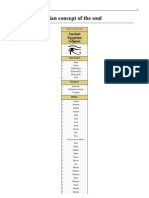Ficino and Golden Chain
Ficino and Golden Chain
Uploaded by
Felipe AguirreCopyright:
Available Formats
Ficino and Golden Chain
Ficino and Golden Chain
Uploaded by
Felipe AguirreCopyright
Available Formats
Share this document
Did you find this document useful?
Is this content inappropriate?
Copyright:
Available Formats
Ficino and Golden Chain
Ficino and Golden Chain
Uploaded by
Felipe AguirreCopyright:
Available Formats
Book Reviews / Comptes rendus / 91
B. Allen. Synoptic Art: Marsilio Ficino on the History of Platonic Interpretation. Istituto Nazionale di Studi sul Rinascimento. Studi e testi, 40.
Michael
J.
Florence:
Leo
S.
Olschki Editore, 1998. Pp.
xiv,
236.
With the passing of Paul Oskar
Kristeller in 1999,
Michael
J.
B. Allen has
become
of,
the leading expert on Marsilio Ficino in the world. Editor and translator
and commentator on, Ficino's In Phaedrum, In Philebum, In Sophistam, and part of Bk. 8 of In Republicam, Allen has also written a series of important articles on Ficino, which are now conveniently gathered together in a Variorum volume of 1995 called Plato's Third Eye. What we have in the present publication are five
fresh studies, loosely related to each other, but collectively and individually of
great value to students of Ficino.
In the first of the essays, Allen tackles
one of the leitmotifs of Ficino's
Platonism, the myth of the theologia prisca, in the context of the charge the
Augustinian
friar
lanus Pannonius laid against Ficino in 1484-85: that he was
irresponsible for having revived the pagan "ancient theology."
As
is
well known,
Ficino initially had this golden chain of six theologians begin with the Egyptian
Hermes Trismegistus, but
sources
for,
at a certain point
he shifted the honor to the Persian
Ficino chose to
Zoroaster. Allen offers us a wonderfully erudite and entertaining discussion of the
and ideological implications
of, the figures
make up
his golden chain. Seeing himself as the "divinely appointed" instrument for the
instauration of Platonic ingnia^ Ficino, in Allen's telling,
as a symbolic, not a chronological succession,
saw his theologia prisca
even
and
in his syncretistic fervor
envisaged Jesus Christ as the "new Zoroaster" (pp. 39-40). Allen contends (p. 40) that Ficino's faith in Zoroaster derives, not from the Byzantine Platonist George
Gemistos Pletho, as most believe, but rather from "Plato's own unimpeachable authority," i.e.. First Alcibiades 121e-122a. I myself remain skeptical because the passage hardly suggests the golden chain, though Ficino could have considered it as legitimizing an idea he got from Pletho. The second essay addresses the fascinating issues of what Ficino thought happened to the Platonic and, therefore, true theological tradition between Plato
and Plotinus and how he dealt with anti-Christian Neoplatonists such as Porphyry and Proclus after Plotinus. Allen sees Ficino as creating an extraordinarily original dialectic between Platonism and Christianity that resulted in Ficino's envisaging himself as a "Neoplatonic magus and seer, who thought and who believed like Plotinus" (p. 90) and who considered his translation of, and commentary on,
Plotinus "as a revival of patristic thought" (p. 92).
justified in scandalously expropriating Scripture to
It is
for that reason that he felt
"This
is
my
beloved son
in
whom I am
city.
image Plato saying of Plotinus, well pleased. Hear him."
In the third essay, Allen turned to the question of how Ficino addressed Plato's
expulsion of the poets from his
Ficino could not but uphold the Platonic edict.
But
to
this set
him
in opposition to a central current of
Renaissance humanism. Allen
takes us through a series of distinctions that Ficino implicitly and explicitly used
make sense of and, to a degree,
mitigate the Platonic decree. In a useful appendix
92 / Renaissance and Reformation / Renaissance
et
Rforme
Allen surveys Ficino*s relationship with poets and poetry of the past and of his
own
time.
The key
to Ficino's thought,
it
turns out,
is
how
Socrates differed, not
just from the Sophists, but from the poets as well.
Not by chance,
therefore, Allen's fourth essay concerns "Socrates
is
Demon
Voice of Conscience." Allen's main text in the matter
and the Ficino's epitome
of the Apology. In an appendix he edits and translates Ficino's epitome and his
related letter to Paolo Ferobanti.
Allen's final essay explores Ficino's answer to the syllogistic and proposi-
permeated the curriculum and culture of contemporary Scholasticism. In contrast, Ficino sought to revive the Platonic method of division, a form
tional logic that
of logic which he believed transcended purely ratiocinative thought and penetrated
the realm of intuition. the
title
It is
this "synoptic art" of Ficino that
provides Allen with
of his book. Allen shows
how Ficino used this
divine dialectic to penetrate
Parmenides (a large part of the essay consists of Allen's analysis of Ficino's commentary on the dialogue), and to link the Parmenides to the theology of that most sublime of Christian authors, the
the
texts, Plato's
most abstruse of Platonic
virtually apostolic Dionysius the Areopagite.
Allen has focused on Ficino less as a Platonic exegete than as a "chosen
instrument"
(p. 13),
highly conscious of his role in the cosmic drama. Thus, for
the book,
it
the overarching
scheme of
was important
life.
for Allen to translate
and
analyze in depth lanus Pannonius'
to Ficino to
letter
questioning Ficino's goals and Ficino's
response justifying his special mission in
Thus
it
was
also critically important
make
sense of the Platonic tradition
Christianity.
after, as
well as before, Plato in
way
that
Socrates,
meshed amicably with who was not a part of
The
sanctifiable, if not sainted,
the golden chain of "ancient theologians,"
especially needed to be explained.
relates to
The
status of poets in the Platonic tradition
artistic tradition
how
Ficino fitted Socrates and the pagan religious and
whole into his historic vision, especially since one of the theologi prisci, Orpheus, was himself a poet and a musician. The odd piece in the volume is that on Ficino's theory of Platonic division as a higher form of logic transcending the level of mere ratiocination. But since it elucidates Ficino's understanding of the Parmenides, we should be glad to have it here or in any other volume. The one serious flaw of the book is that it lacks an index locorum and a
as a
detailed subject/name index.
to say
No
index could capture Allen's
many
arresting, not
memorable
phrases, but indices
would
in other
ways increase
significantly
the usability of the book. Allen's analyses are dense with stimulating ideas, fresh
references, and
to the
its
comments on
the conclusions of others. Scholars will
book time and again for leads and opinions. Yet even if margins and the rear cover with notes, as I have done, consultation
in fact
want to refer one has marked up
will not
always result in one's finding an item that may
be
in the
book.
JOHN MONFASANI, State
University of New York
-Albany
You might also like
- Blumenthal - Marinus' Life of Proclus. Neoplatonist BiographyDocument26 pagesBlumenthal - Marinus' Life of Proclus. Neoplatonist Biography123KalimeroNo ratings yet
- Bos - The 'Vehicle of Soul' and The Debate Over The Origin of This ConceptDocument20 pagesBos - The 'Vehicle of Soul' and The Debate Over The Origin of This ConceptJosue GutierrezNo ratings yet
- Armstrong1974 Infinite Regress Argument and The Problem of UniversalsDocument13 pagesArmstrong1974 Infinite Regress Argument and The Problem of UniversalsFábbio CerezoliNo ratings yet
- Ecstasy and Possession - The Attraction of Women To The Cult of DionysusDocument26 pagesEcstasy and Possession - The Attraction of Women To The Cult of DionysusFelipe AguirreNo ratings yet
- Francesco PatriziDocument14 pagesFrancesco PatriziIvana MajksnerNo ratings yet
- Nvmen Vol 52Document562 pagesNvmen Vol 52Esotericist MinorNo ratings yet
- The Cosmotheology of de Mundo in Ps. AristotleDocument14 pagesThe Cosmotheology of de Mundo in Ps. AristotleVicente GarridoNo ratings yet
- The notion of pneuma (πνεῦμα) in the work of John Philoponus (490A.D-570A.D)Document11 pagesThe notion of pneuma (πνεῦμα) in the work of John Philoponus (490A.D-570A.D)sholariosNo ratings yet
- Nectar in Renaissance Esotericism: Ficino, Pico, Agrippa, and BrunoDocument5 pagesNectar in Renaissance Esotericism: Ficino, Pico, Agrippa, and BrunojuliointactaNo ratings yet
- Intro Commentary On Plato's Timaeus ProclusDocument10 pagesIntro Commentary On Plato's Timaeus ProclusdoppiapresaNo ratings yet
- Proclus On Place As The Luminous Vehicle PDFDocument24 pagesProclus On Place As The Luminous Vehicle PDFAbraham ZedekNo ratings yet
- (Kenneth Sylvan Guthrie) PorphyryDocument48 pages(Kenneth Sylvan Guthrie) PorphyryCarlos De LaraNo ratings yet
- Dillon J., Intellect and The One in Porphyry's Sententiae, IJPT IV, 2010Document9 pagesDillon J., Intellect and The One in Porphyry's Sententiae, IJPT IV, 2010Strong&PatientNo ratings yet
- Platon Si Academia Veche de ZellerDocument680 pagesPlaton Si Academia Veche de ZellerDan BrizaNo ratings yet
- Greek Philosophical Terms PDFDocument4 pagesGreek Philosophical Terms PDFJennifer LeQuireNo ratings yet
- The Internal Senses in Nemesius Plotinus PDFDocument21 pagesThe Internal Senses in Nemesius Plotinus PDFPaloma Hernández-RubioNo ratings yet
- Platonism and Neoplatonism The Oxford EDocument9 pagesPlatonism and Neoplatonism The Oxford ElistboxNo ratings yet
- Plato's Phaedrus R. Hackforth Plato's Phaedrus. Translated With Introduction and Commentary. Tate, JDocument3 pagesPlato's Phaedrus R. Hackforth Plato's Phaedrus. Translated With Introduction and Commentary. Tate, JCy PercutioNo ratings yet
- Nvmen Vol 51Document551 pagesNvmen Vol 51Esotericist MinorNo ratings yet
- Silverstein 1948 - On Bernardus SilvestrisDocument26 pagesSilverstein 1948 - On Bernardus SilvestrisTW100% (1)
- Eriugena Editions 2012Document13 pagesEriugena Editions 2012Luiz Fernando Fontes-TeixeiraNo ratings yet
- Plato'S Cosmology: The Timaeus: The Forms vs. The CosmosDocument22 pagesPlato'S Cosmology: The Timaeus: The Forms vs. The CosmosBituon Class0% (1)
- PROCLUS Exegis of The Demiurge in The TimaeusDocument24 pagesPROCLUS Exegis of The Demiurge in The TimaeusAbraham ZedekNo ratings yet
- Miguel Á. Granada (Mersenne's Critique of Bruno)Document25 pagesMiguel Á. Granada (Mersenne's Critique of Bruno)mmhaccrNo ratings yet
- Aristotle in Byzantium: Klaus OehlerDocument14 pagesAristotle in Byzantium: Klaus OehlerMihai FaurNo ratings yet
- Ian Irvine: Two Essays Australian PoetryDocument24 pagesIan Irvine: Two Essays Australian PoetryIan Irvine (Hobson)No ratings yet
- Evagrius Ponticus and The Condemnation oDocument10 pagesEvagrius Ponticus and The Condemnation oАлександар РаковићNo ratings yet
- Diligentia Et Divina Sorte Oracular Inte PDFDocument24 pagesDiligentia Et Divina Sorte Oracular Inte PDFLeonardo VidoniNo ratings yet
- Adamson 2006 Vision - Light - and - Color - in - Alkindi - Ptolemy - and - The - Ancient - Commentators PDFDocument30 pagesAdamson 2006 Vision - Light - and - Color - in - Alkindi - Ptolemy - and - The - Ancient - Commentators PDFlamiabaNo ratings yet
- Do RCs Know About The Corpus Hermeticum and Hermetic Tradition?Document11 pagesDo RCs Know About The Corpus Hermeticum and Hermetic Tradition?Who moved my Cheese?No ratings yet
- Plessner The Turba PhilosophorumDocument9 pagesPlessner The Turba PhilosophorumAcca Erma SettemontiNo ratings yet
- Iamblichus Chalcidensis MPAGDocument3 pagesIamblichus Chalcidensis MPAGBJMacLennanNo ratings yet
- Plato S Influence On Gerogios Gemistos PDocument20 pagesPlato S Influence On Gerogios Gemistos PtreebeardsixteensNo ratings yet
- Annas, Julia E. - Hellenistic Philosophy of MindDocument151 pagesAnnas, Julia E. - Hellenistic Philosophy of Mindadrian floresNo ratings yet
- S. Cooper The Platonist Christ. of M. VictorinusDocument24 pagesS. Cooper The Platonist Christ. of M. VictorinusAnonymous OvTUPLm100% (1)
- Matter Is Not A Principle. Neopythagorean Attempts at MonismDocument29 pagesMatter Is Not A Principle. Neopythagorean Attempts at MonismxyNo ratings yet
- On Proclus and His Influence On Medieval PhilosophyDocument216 pagesOn Proclus and His Influence On Medieval PhilosophyDereck Andrews100% (2)
- Glucker J., Plato in The Academy. Some Cautious ReflectionsDocument22 pagesGlucker J., Plato in The Academy. Some Cautious ReflectionsStrong&PatientNo ratings yet
- To Become An EikonDocument38 pagesTo Become An EikonMarco LucidiNo ratings yet
- Plotinus' Demonological IdeasDocument10 pagesPlotinus' Demonological Ideasdquinn9256No ratings yet
- Adkins - Theoria Versus Praxis in The Nicomachean Ethics and The RepublicDocument18 pagesAdkins - Theoria Versus Praxis in The Nicomachean Ethics and The RepublicFolKalFNo ratings yet
- DEBUS, A. G. Chemists, Physicians, and Changing Perspectives On The Scientific RevolutionDocument16 pagesDEBUS, A. G. Chemists, Physicians, and Changing Perspectives On The Scientific RevolutionRoger CodatirumNo ratings yet
- Nvmen Vol 47Document466 pagesNvmen Vol 47Esotericist MinorNo ratings yet
- History - Medieval and Renaissance Philosophy of MindDocument6 pagesHistory - Medieval and Renaissance Philosophy of Mindgauchofiero99No ratings yet
- Seneca Moral Essays Vol 2Document135 pagesSeneca Moral Essays Vol 2Pleasant KarlNo ratings yet
- Suarez On The Reduction of Categorical RelationsDocument24 pagesSuarez On The Reduction of Categorical RelationsGabriel de AlmeidaNo ratings yet
- Sirianus PDFDocument27 pagesSirianus PDFWilliam Davidans SversuttiNo ratings yet
- ProclusDocument428 pagesProclusCarmen HntNo ratings yet
- Numen Volume 19Document248 pagesNumen Volume 19θεωρία AπόφασιςNo ratings yet
- Gracious Laughter - Marsilio Ficino's AnthropologyDocument31 pagesGracious Laughter - Marsilio Ficino's AnthropologyAléxandros PróodosNo ratings yet
- Plato's Seventh Letter A.E. TaylorDocument24 pagesPlato's Seventh Letter A.E. TaylorClassicusNo ratings yet
- Daniele Iozzia, Aesthetic Themes in Pagan and Christian Neoplatonism - From Plotinus To Gregory of NyssaDocument145 pagesDaniele Iozzia, Aesthetic Themes in Pagan and Christian Neoplatonism - From Plotinus To Gregory of NyssaRamón del Buey100% (2)
- Proclus, Marinus - On HappinessDocument14 pagesProclus, Marinus - On HappinessnatzucowNo ratings yet
- Harold Cherniss and The Study of Plato TodayDocument12 pagesHarold Cherniss and The Study of Plato TodayOevide SeinNo ratings yet
- Prolong Omen ADocument17 pagesProlong Omen AMikolaj MartinjakNo ratings yet
- The Eudemian and Nicomachean Ethics: A Study in the Development of Aristotle's ThoughtFrom EverandThe Eudemian and Nicomachean Ethics: A Study in the Development of Aristotle's ThoughtNo ratings yet
- The Golden Calf, Which the World Adores, and DesiresFrom EverandThe Golden Calf, Which the World Adores, and DesiresNo ratings yet
- Life of Hierocles (Print)Document0 pagesLife of Hierocles (Print)Felipe AguirreNo ratings yet
- Damascius: The Life of Hypatia From The SudaDocument2 pagesDamascius: The Life of Hypatia From The SudaPetro VourisNo ratings yet
- Synesius, The Egyptian TaleDocument27 pagesSynesius, The Egyptian TaleFelipe AguirreNo ratings yet
- Synesius On Dreams - Tr. FitzgeraldDocument0 pagesSynesius On Dreams - Tr. FitzgeraldFelipe AguirreNo ratings yet
- Ancient Egyptian Concept of The SoulDocument8 pagesAncient Egyptian Concept of The SoulaguirrefelipeNo ratings yet
- Bett Richard - Immortality and The Nature of The Soul in The PhaedrusDocument27 pagesBett Richard - Immortality and The Nature of The Soul in The PhaedrusFelipe AguirreNo ratings yet
- Supramundane Greek HyperkosmioiDocument2 pagesSupramundane Greek HyperkosmioiFelipe AguirreNo ratings yet
- Plato's Gods and The Way of IdeasDocument15 pagesPlato's Gods and The Way of IdeasFelipe AguirreNo ratings yet
- The Metaphysics of Polytheism in ProclusDocument217 pagesThe Metaphysics of Polytheism in ProclusFelipe AguirreNo ratings yet
- Mystical Theology and Spiritual Experience in Proclus' Platonic TheologyDocument11 pagesMystical Theology and Spiritual Experience in Proclus' Platonic TheologyFelipe AguirreNo ratings yet
- The Third Intelligible Triad and The Intellective GodsDocument20 pagesThe Third Intelligible Triad and The Intellective GodsFelipe AguirreNo ratings yet
- The Hermetic ΛόγοςDocument257 pagesThe Hermetic ΛόγοςFelipe Aguirre100% (1)
- RESUMEN Sā KhyaDocument17 pagesRESUMEN Sā KhyaFelipe AguirreNo ratings yet
- CowDocument27 pagesCowSadhvi MaatNo ratings yet
- Damascius, Simplicuis and The Return From PersiaDocument31 pagesDamascius, Simplicuis and The Return From PersiaFelipe AguirreNo ratings yet
- Ammonius (El Neoplatónico)Document16 pagesAmmonius (El Neoplatónico)Felipe AguirreNo ratings yet
- Athanassiadi - Testimony of IamblichusDocument17 pagesAthanassiadi - Testimony of IamblichusFelipe Aguirre100% (1)
- Marsilio Ficino and Renaisance of PlatonismDocument7 pagesMarsilio Ficino and Renaisance of PlatonismFelipe AguirreNo ratings yet








